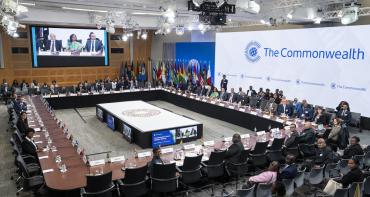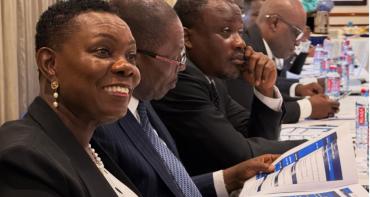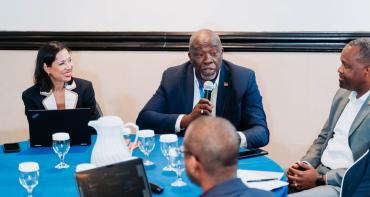Commonwealth Secretariat and 16 Commonwealth Africa member states examine assistance that will deliver significant results at meeting in Rwanda
Rwanda has gained much by being a member of a strong organisation like the Commonwealth, which is a solid bond of friendship and partnership among other Commonwealth member states, said the Permanent Secretary for the Rwanda Ministry of Foreign Affairs and Co-operation, Mary Baine.
Addressing delegates at a Commonwealth Points of Contact (POCs) and Principal Contact Points (PCPs) meeting in Kigali, Rwanda, on 18 April 2012, Ms Baine added that her country recognised the importance of training courses and programmes provided by the Secretariat and the “invaluable” technical assistance of the Commonwealth Fund for Technical Co-operation (CFTC).
| Rwanda is the Commonwealth's newest member, joining the association in 2009. |
“Rwanda is committed to developing strong relationships with other organisations with links to the Commonwealth and individual Commonwealth member countries in order to fully optimise the benefits that come from belonging to such a large network of the Commonwealth,” she stated.
At the PoC and PCP meeting, 16 Commonwealth Africa member states shared their experiences, reviewed current developments and reached agreement on common strategies for strengthening the partnership between member states and the Secretariat on development programmes.
| Some Secretariat divisions also have POCs based in regional organisations. |
Each Commonwealth country has a designated PCP nominated by their government, who works with the Secretariat in implementing technical and development assistance programmes. POCs are officials in member governments’ ministries or departments, who liaise with Secretariat officers on capacity development issues.
During the three-day meeting from 18 to 20 April, the Secretariat’s division working on public sector development – the Governance and Institutional Development Division - worked with delegates to examine the areas of assistance that will deliver significant results to member countries, based on their national development priorities.
Delegates reaffirmed the Secretariat’s comparative advantages in development assistance including trustworthiness, credibility, convening power at every level, flexibility, responsiveness, neutrality and respect for country ownership.
They also welcomed Commonwealth information-sharing initiatives such as Commonwealth Connects – a website hosting resources and collaborative networks - and a dedicated extranet for POCs, PCPs and London-based high commissions to communicate and co-ordinate with the Secretariat on CFTC-funded programmes of assistance.
| South-south co-operation: a process in which developing countries share and support each other through the sharing of best practices, technical expertise and resource mobilisation. |
Participants emphasised the importance and need for the Secretariat’s programmes in public sector development and governance to deepen south-south co-operation, build stronger partnerships with other development agencies, mobilise political support to underpin its technical assistance, and the effective application of monitoring and evaluation for results and impact.



